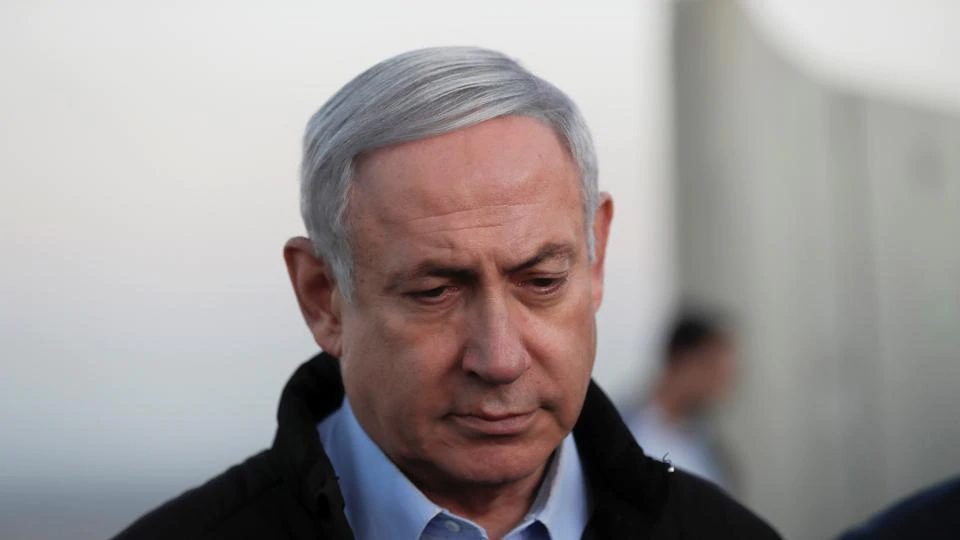Benjamin Netanyahu’s battle to hold on to power is getting more complicated.
The longest-serving Israeli prime minister, famous for getting out of the tightest political corners, was indicted last week on bribery and fraud charges. Now, the state prosecutor’s office reportedly is reviewing whether to let him form a new government. To make matters worse, he’s facing a rare challenge from within his own party.
He’s never been in such a dire predicament during his combined 13 years in power, and the next 2 1/2 weeks will be critical to his survival.
For three years, as police and prosecutors examined allegations of corruption against him, Netanyahu enjoyed the public support of his Likud party, even after two inconclusive national elections left Israel without a fully functioning government for nearly a year. On Sunday, a would-be heir called on Likud to hold a snap leadership contest, claiming that he — unlike Netanyahu — could “easily form a government.”
“Does anyone think that in a third, fourth, fifth or sixth election, he could form a government?” Likud lawmaker Gideon Saar asked in an interview Saturday on Channel 12 news. “Either this crisis continues, or God forbid, we’ll lose power to our rivals.”
Legal Challenge
Also on Sunday, the not-for-profit Movement for Quality Government in Israel petitioned the High Court of Justice to force Netanyahu to resign or step aside while his trial proceeds. Anticipating such a move, the state prosecutor’s office was gearing up to issue a recommendation on whether Netanyahu could form a government, Army Radio reported.
The court dismissed the good governance group’s petition, saying it had jumped the gun because all legal processes haven’t been exhausted in connection with an earlier petition it filed on the matter. The group said it would wait several days and resubmit the petition.
This has been Netanyahu’s toughest year yet, and not only on the legal front. His early elections gambit backfired, and he ended up leading the country into two inconclusive rounds of balloting. Now, parliament will dissolve by midnight Dec. 11 and a third round of voting in under a year will be called if one of the lawmakers can’t put together a government by then. His challenger, former military chief Benny Gantz, has said he’s willing to team up with Likud in a power-sharing arrangement as long as Netanyahu isn’t the party head.
With a widely unpopular election do-over looming, Likud might decide it’s not worth rallying around Netanyahu and move to dump him.
Even so, don’t count him out just yet, said Gidi Rahat, a political scientist affiliated with Hebrew University and the Israeli Democracy Institute research center.
“He is still fighting, and although there are preliminary signs in Likud that some are beginning to distance themselves, Netanyahu hasn’t had the last word yet,” Rahat said. “He is fighting for his life and to him, nothing else matters.”The prime minister, who denies wrongdoing, has accused law enforcement of trying to stage a coup against him and has vowed to continue to lead the country.
Saar — a popular former minister who left Likud over disagreements with Netanyahu but recently made a comeback — is the only senior party member to openly challenge the prime minister. Other influential Likud officials have remained silent, and Channel 13 news reported on Friday that some senior Likud members were discussing how to shunt Netanyahu aside.
Likud, in a statement, castigated Saar for daring to challenge Netanyahu at this time, accusing him of “displaying zero loyalty and maximum subversion.”The prime minister, who denies wrongdoing, has accused law enforcement of trying to stage a coup against him and has vowed to continue to lead the country.
Saar — a popular former minister who left Likud over disagreements with Netanyahu but recently made a comeback — is the only senior party member to openly challenge the prime minister. Other influential Likud officials have remained silent, and Channel 13 news reported on Friday that some senior Likud members were discussing how to shunt Netanyahu aside.
Likud, in a statement, castigated Saar for daring to challenge Netanyahu at this time, accusing him of “displaying zero loyalty and maximum subversion.”The leadership race, if called, will be decided in the Likud central committee, a group of more than 3,500 party members who overwhelmingly have supported Netanyahu in the past. A Likud official, speaking on condition of anonymity to discuss party dealings, thought Saar didn’t necessarily expect to win and was more interested in building himself up in the public eye.
Polls commissioned since the indictment showed about half of those questioned said Netanyahu shouldn’t continue to serve, and roughly one-third said he should.According to one interpretation of Israeli law, Netanyahu is allowed to remain in office until he’s exhausted all avenues of appeal. But others argue that there is judicial precedent to force him to resign because in the past, the High Court has forced other politicians to step down after they were indicted on serious charges including bribery.
“The questions we are faced with are new ones that have never been posed,” said Suzi Navot, professor of law at the Haim Striks School of Law in Rishon Lezion.


